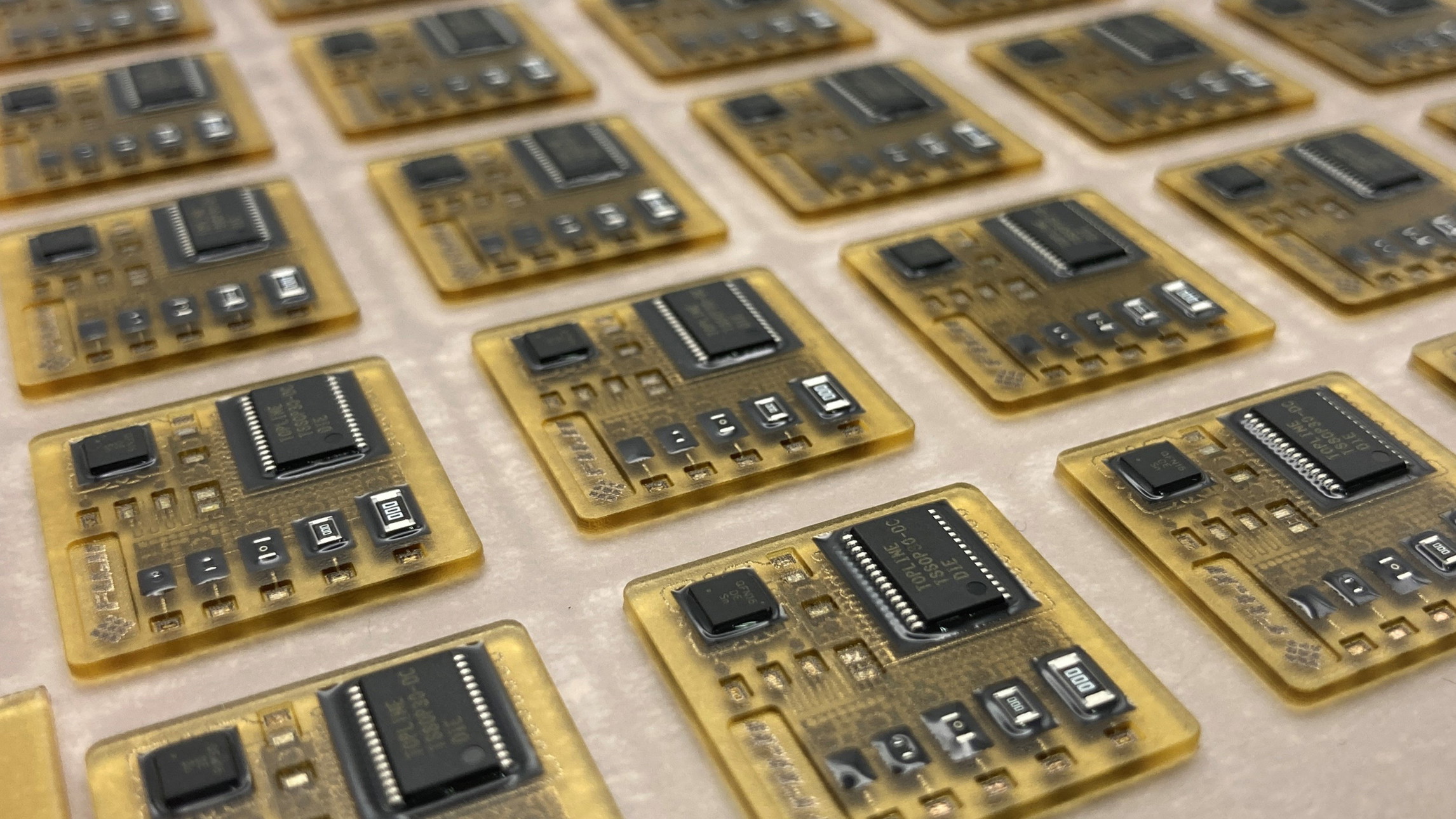FPM-Trinity Case Studies By FUJI

The FPM-Trinity 3D printer seamlessly integrates AME and SMT technologies to automate electronic board production, embodying Fuji's own advanced processes for producing high quality electronic devices.
- Heat-resistant resin
- Circuit formation via inkjet printing
- Sloped via structure for layer connectivity
- Solderless, low-temperature component placement
Utilizing these advanced techniques, we have developed numerous case studies, showcasing the impressive capabilities of our 3D printer.
Robot Power Board
Prototype power supply boards were custom-designed for a robot, with layouts and shapes tailored to fit the installation site. Spacers for mounting were produced simultaneously, ensuring seamless integration. These specially shaped boards are efficiently manufactured with minimal waste, helping to reduce overall weight.
Animal Sensor Board
In collaboration with the Faculty of Engineering, Kyushu University, we have developed custom sensors for animal health monitoring trials. These prototype boards enable the creation of custom solutions for research and proof of concept in a short timeframe. The next phase of development focuses on optimizing the design for better comfort and wearability for animals.
IoT Evaluation Boards
Leafony from the Trillion Node Study Group offers Arduino-compatible boards that simplify the creation of compact, low-power deivces by stacking functional modules. This approach accelerates IoT development by allowing easy customization of hardware. By incorporating the FPM-Trinity to handle certain functions, the design, manufacturing, and verification process can be completed in just four days, further reducing development time.
Electric Prosthetic Arm Sensor
Finch is a highly functional, three-fingered electric prosthetic hand with a simple design that is both lightweight and affordable. Its housing is produced using 3D printing technology. By collaborating with FPM-Trinity printer to redesign the muscle flexing sensor, its thickness was halved, and a curved surface was introduced, reducing the stress placed on skin and improving user comfort.
Decorative LED Circuit Boards
In collaboration with Digital Factory Corporation, we have successfully integrated LED circuit boards, manufactured by FPM-Trinity, into items produced using polyjet 3D printing technology. Though still experimental, this approach aims to combine additive technologies to enable the creation of structures with customizable color, softness, and size, all while embedding electronic functions.
Fingernail-Shaped NFC Device
This fingernail-shaped NFC device has built-in electronic components and an antenna. Using a 3D scan of the fingernail, it is possible to create a customized fit, and even print the antenna circuit pattern directly with a 3D printer, combining precision and functionality in a personalized design.
Smart Glasses
These smart glasses have sensors seamlessly integrated into the frame. By 3D scanning your favorite glasses, it is possible to create a customized pair with a tailored fit. Electronic components and circuit patterns are able to be embedded directly into the frame, for a minimalistic design.
Board for Wafer Inspection
We have developed a prototype wafer inspection board for "minimal fabs," enabling the rapid and cost-effective production of small quantities of semiconductor chips. Our boards can be custom-designed for various types of semiconductor chips and produced with quick turnaround times.
Board With Resin Encapsulated Parts
In collaboration with the National Institute of Advanced Industrial Science and Technology, a prototype animal monitoring sensor board with wireless communication, a temperature sensor, and microcontroller was developed. After assembly, parts can be encapsulated in resin by reprinting the resin onto the board.






















